-
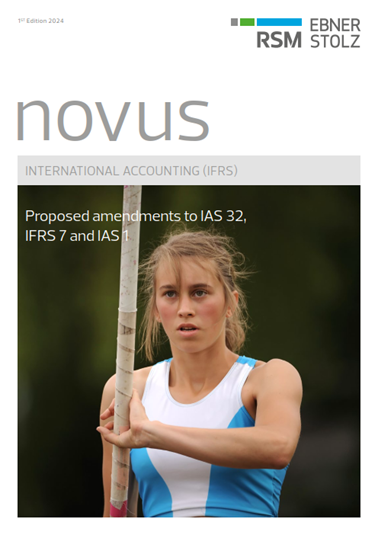 novus IFRS 1st Edition 2024
novus IFRS 1st Edition 2024The IASB Exposure Draft “Financial Instruments with Characteristics of Equity - Proposed amendments to IAS 32, IFRS 7 and IAS 1” proposes amendments to IAS 32 in relation to the distinction between equity and liabilities and to IFRS 7 and IAS 1 on disclosure and presentation requirements to meet the increased accounting challenges posed by the more complex financial instruments. Also read about the amendments adopted by the EU to IAS 12 on global minimum taxation, amendments to IFRS 16 on sale and leaseback transactions and amendments on IAS 1 on the classification of liabilities with covenants, the IFRIC updates since November 2023 and all further developments in the area of international accounting.
-
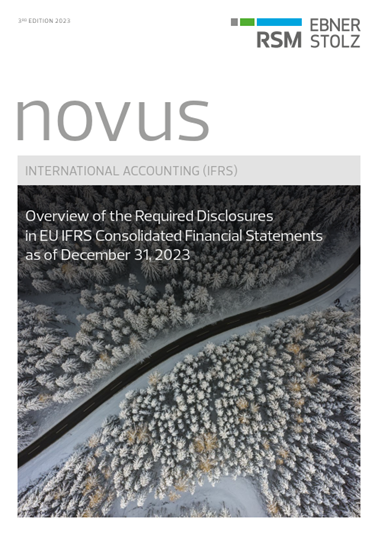 novus IFRS 3rd Edition 2023
novus IFRS 3rd Edition 2023We have compiled the key disclosures that must be reported in EU IFRS consolidated financial statements as of 31 December 2023 concerning standards and interpretations that have already been adopted. Furthermore the IASB has in addition to the Exposure Draft "Annual Improvements to IFRS Accounting Standards - Volume 11", published amendments to IAS 21 and IAS 12 and announced two new IFRS accounting standards for 2024.
-
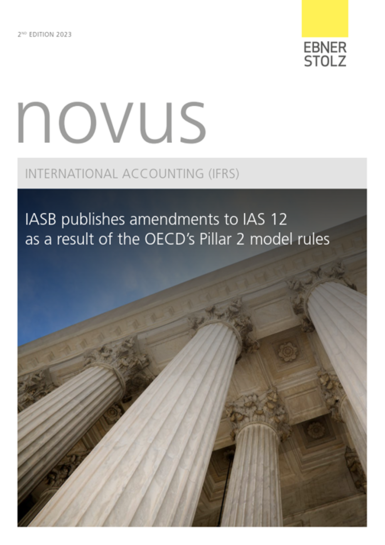 novus IFRS 2nd Edition 2023
novus IFRS 2nd Edition 2023 -
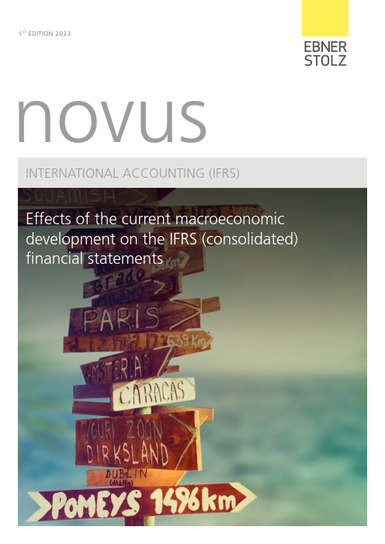 novus IFRS 1st Edition 2023
novus IFRS 1st Edition 2023The global minimum tax for large multinational companies is to be implemented in national law by the end of 2023. To mitigate the effects of the global minimum tax, the IASB has published an Exposure Draft ED/2023/1 "International Tax Reform - Pillar 2 Model Rules". In the current issue of our novus IFRS, we present its main contents.
-
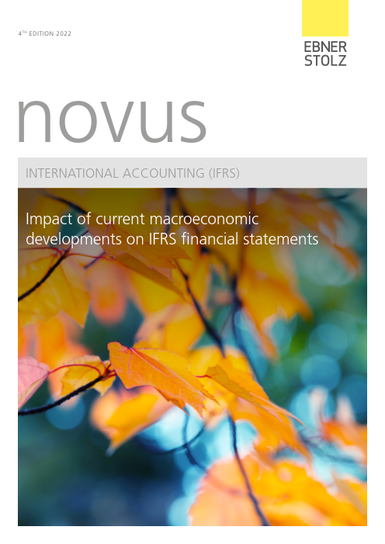 novus IFRS 2nd Edition 2022
novus IFRS 2nd Edition 2022Not least due to Russia's war of aggression in Ukraine, the social, political and economic situation in Germany and the rest of the world is tense. Companies are having to contend with high inflation rates, a shortage of workers and skilled workers, supply chain difficulties and the expected recession. These challenges lead to great uncertainties and risks, which also affect IFRS reporting. In this issue of the novus IFRS, among other things, we examine the technical advice from the IDW and ESMA, which provide companies with specific assistance with accounting and reporting in this uncertain environment.
-
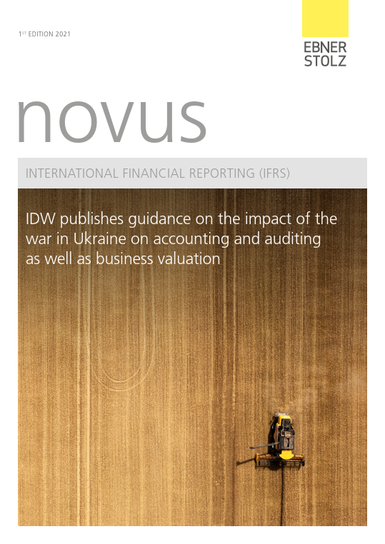 novus IFRS 1st Edition 2022
novus IFRS 1st Edition 2022In this edition of novus IFRS, we present the technical guidance published by the IDW on the impact of the war in Ukraine on accounting and auditing as well as business valuation.
-
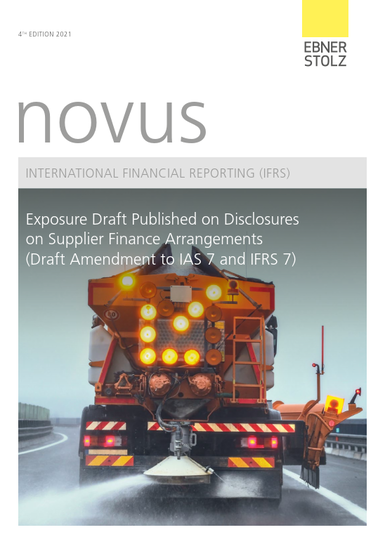 novus IFRS 4th Edition 2021
novus IFRS 4th Edition 2021In this last novus IFRS before the end of the year, we inform you about the changes to the reverse factoring procedure. In addition, we have compiled key disclosures to be reported in an EU-IFRS consolidated financial statement as of December 31, 2021 with regard to standards and interpretations that have already been adopted.
-
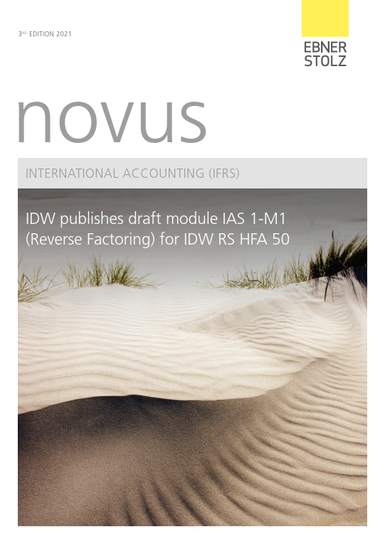 novus IFRS 3rd Edition 2021
novus IFRS 3rd Edition 2021Reverse factoring is an increasingly popular option for pre-financing a company's suppliers. In contrast to conventional factoring, the initiative comes from the customer and not from the supplier. In this novus IFRS, we inform you about how the IDW, with the draft amendment IAS 1-M1 (Reverse Factoring) to IDW RS HFA 50, has clarified the questions of whether the previous obligation from deliveries and services is to be derecognized or whether it is to be In addition, we will provide you with information on the latest developments in the field of financial reporting. In addition, we present the latest IASB publications "Subsidiaries not publicly accountable: Disclosures in the notes" and "First-time adoption of IFRS 17 and IFRS 9 - Comparative information".
-
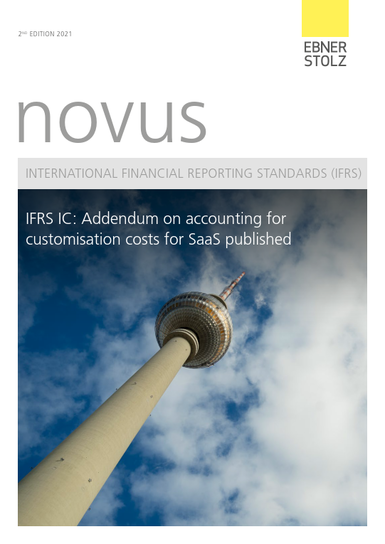 novus IFRS 2nd Edition 2021
novus IFRS 2nd Edition 2021The IFRS Interpretations Committee (IFRS IC) has addressed the specifics of accounting for configuration and customization costs in software-as-a-service (SaaS) arrangements. In this edition of novus IFRS, we inform you about the results of the deliberations on this topic as well as about other important topics that the standard setters dealt with in the second quarter of 2021.
-
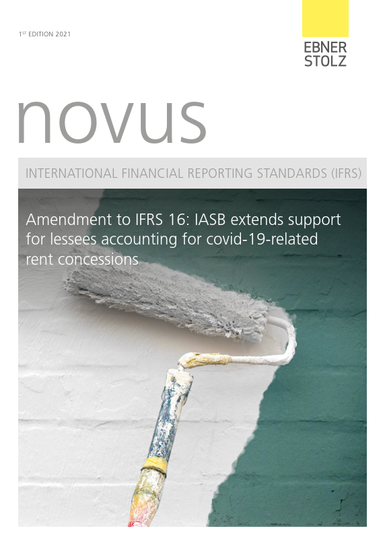 novus IFRS 1st Edition 2021
novus IFRS 1st Edition 2021In this issue of novus IFRS, we have compiled for you important publications on IFRS accounting published by standard setters and institutions. In addition, we present the latest publications of the IASB.
-
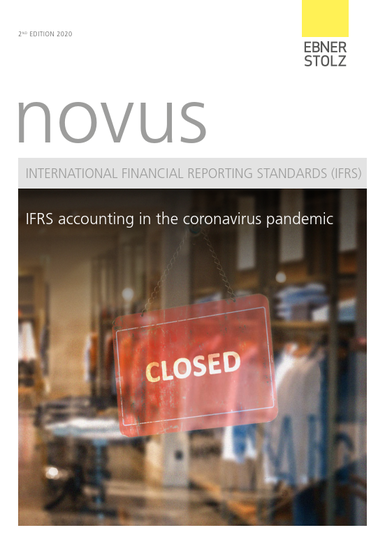 novus IFRS 2nd Edition 2020
novus IFRS 2nd Edition 2020The corona pandemic continues to have a full grip on social life and also the economy - and the economic challenges are reflected in new accounting requirements. That is why we have compiled an overview of important publications on IFRS accounting in this edition of novus IFRS.
-
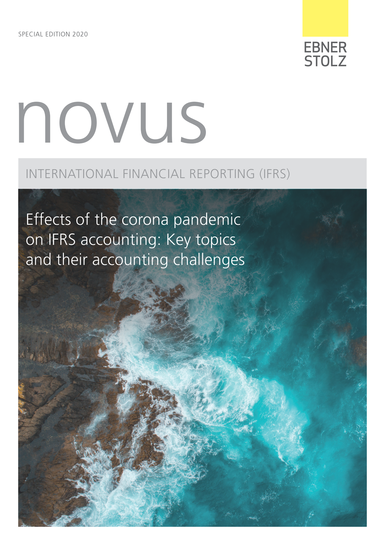 novus IFRS 1st Edition 2020
novus IFRS 1st Edition 2020In this edition of novus IFRS, we look at significant effects on IFRS accounting and the challenges in preparing annual / consolidated and interim financial statements. The relevance of the topics described below varies widely - depending on the industry and the conditions of the respective company.
